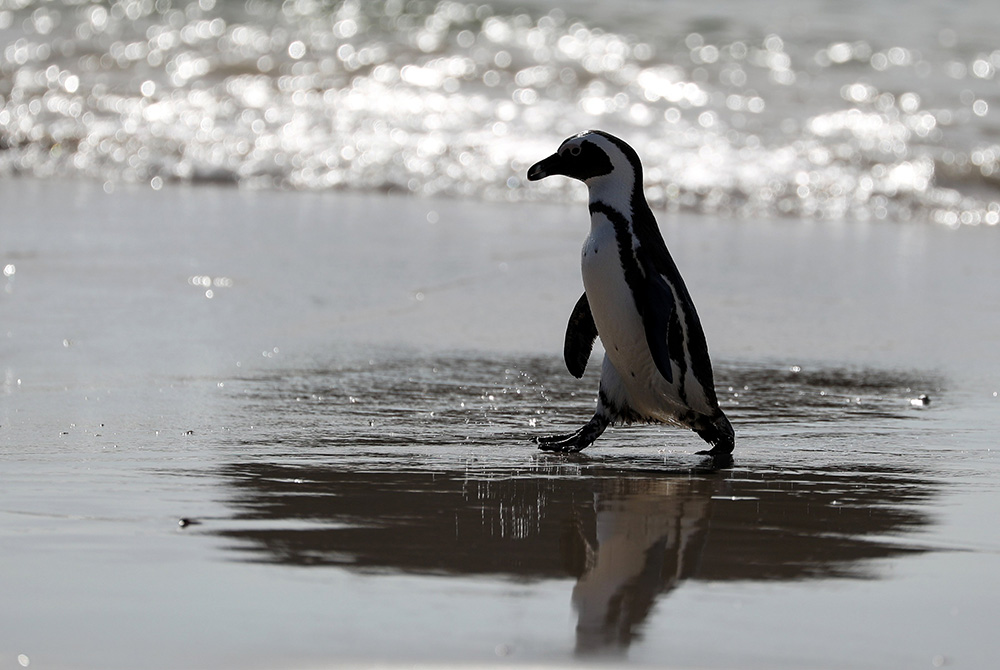
An endangered African penguin emerges from the water at Seaforth Beach, South Africa, Nov. 3, 2020. (CNS/Reuters/Sumaya Hisham)
Clinging on a honeycomb and glimmering gold, Byzantine-style background, the image of a honeybee appeared on computer screens around the globe. And then it began to speak.
I am the honeybee. I work tirelessly to produce my honey, my pollen and to carry out my irreplaceable work of pollination. My species is threatened due to the use of toxic pesticides, destruction of my habitat and lack of forage due to monocultures. Without me, coffee, apples, almonds, tomatoes and cocoa, just to name a few of the crops, would be wiped out. I have intrinsic value in my own right, not just my use to humans.
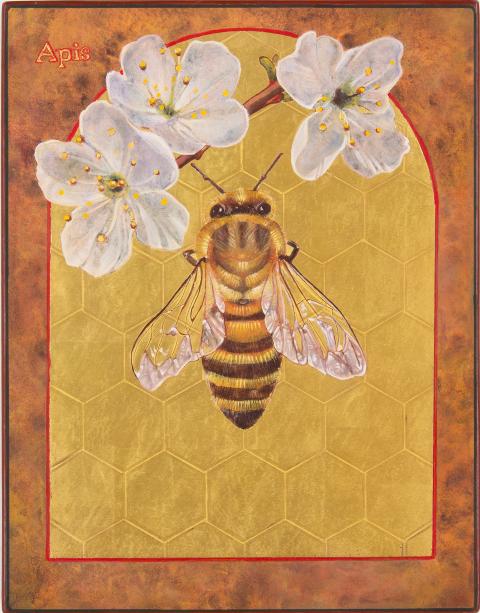
"Apis, the Honey Bee," Angela Manno, 2019, egg tempera and gold leaf on wood (Courtesy of the artist)
Following the honeybee was the loggerhead sea turtle, around since the time of the dinosaurs, who said, "I often mistake plastics floating in the ocean and plumes of oil from oil spills for my food. When I eat them, I die. ... I am now critically endangered."
The "first-person" testimonials from these and other endangered and threatened species — from the Florida panther and Andean marsupial frog, to the chambered nautilus and Philippines orchid — opened an online discussion May 23 as part of Laudato Si' Week, the Vatican's eight-day celebration of the seventh anniversary of Pope Francis' 2015 encyclical on ecology, "Laudato Si', on Care for Our Common Home."
Hosted by the Australian Catholic University's Rome campus, the online event brought together religious, Indigenous and academic voices around the world to highlight the importance of biodiversity to the planet and humanity and ways to better ensure its protection.
The endangered species testimonials, part of a prayer created and narrated by artist Angela Manno — who also displayed her paintings of various creatures as sacred icons — allowed participants in the webinar to literally hear the cry of the Earth — a request from Francis in his encyclical and one of the seven goals of the Vatican's Laudato Si' Action Platform that are the focus of Laudato Si' Week 2022.
"Because of us, thousands of species will no longer give glory to God by their very existence, nor convey their message to us. We have no such right," Francis wrote in Laudato Si'. The pope re-upped his support for greater biodiversity conservation over the weekend, urging everyone to work together "to build the 'global village of care' " among humans and the environment.
Off Australia's southern coast of New South Wales, pollution from PFAS chemicals has endangered sea turtles and the way of life for Aboriginal people, contaminating centuries-old fishing grounds and drinking water.
Theresa Ardler, a Gweagal Aboriginal woman and director of Gweagal Cultural Connections, told the webinar that her community filed a class action in February 2021 against the Australian government, alleging the pollution has not only depleted culturally significant waters but led to health issues, including increases in breast cancer.
Meanwhile, sand dunes are eroding as climate change drives sea levels higher and higher.
"We look at our land and ocean like our mother, and that's how we treat it — with such respect. Our land has been destroyed. Our mother has been taken away from us," Ardler said.
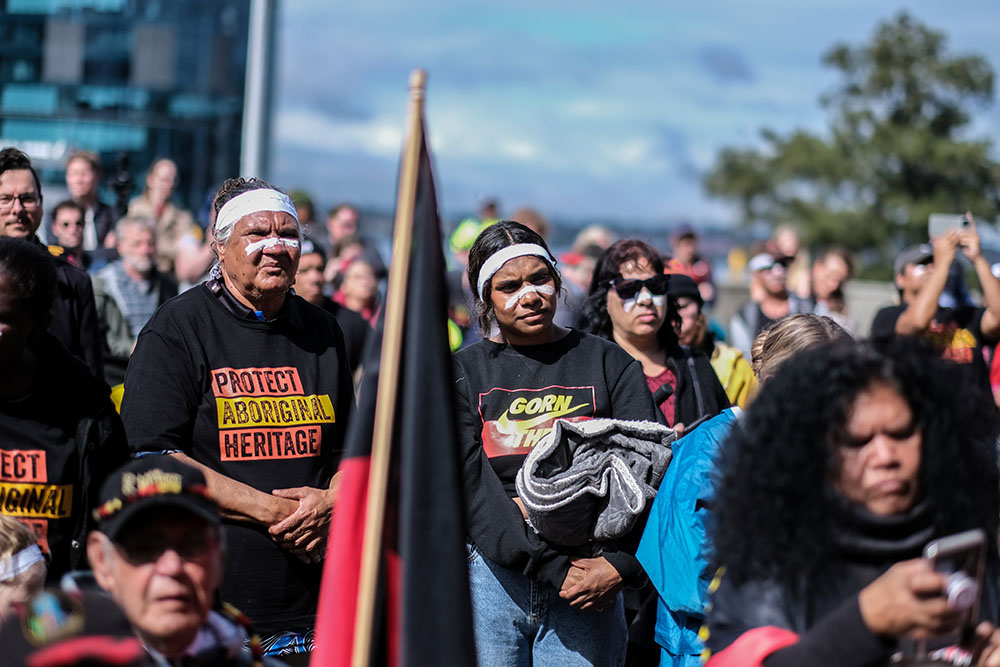
Aboriginal Australians take part in a protest in Perth Aug. 19, 2021, against what they say is a lack of detail and consultation on new heritage protection laws, after the Rio Tinto mining group destroyed ancient rock shelters for an iron ore mine last year. (CNS/Kimberley Land Council via Reuters/Gabrielle Timmins)
Worldwide, threats to the planet's biodiversity are on the rise.
As many as 1 million of the world's 8 million estimated plant and animal species face extinction this century, and in many cases within decades, according to a 2019 United Nations report. The scientific assessment found extinction accelerating at unprecedented rates, which it attributed to changes in land and sea use, exploitation, climate change, pollution and invasive species. Since 1970, two-thirds of wild species populations have been lost, per the World Wildlife Fund's 2020 Living Planet report.
A separate report from the top U.N. climate science body in March reported that between 3% and 14% of all species face extinction should global temperatures rise by 1.5 degrees Celsius. Staying at or below that threshold is a primary goal under the Paris Agreement, but the world is on track to surpass the threshold within the next decade should current warming rates persist.
Advertisement
"Safeguarding biodiversity and ecosystems is fundamental to climate resilient development," the report authors wrote.
Protecting biodiversity doesn't just benefit plants and animals, said Salesian Sr. Alessandra Smerilli, secretary of the Vatican Dicastery for Promoting Integral Human Development, who noted how Laudato Si' highlights the interconnectedness humanity has with other created species and with God as creator. A 2020 U.N. global biodiversity report, for instance, stated that conserving biodiversity can help in addressing climate change, long-term food security and future pandemics.
"When biodiversity flourishes, human life flourishes," said Smerilli, who is also a member of the Vatican's COVID-19 task force.
But so far, international efforts to conserve biodiversity have come up short, bringing the world "to the brink of an unprecedented biodiversity collapse," the Salesian sister told the online audience from Rome, adding that "we are at an inflection point with life-altering consequences."
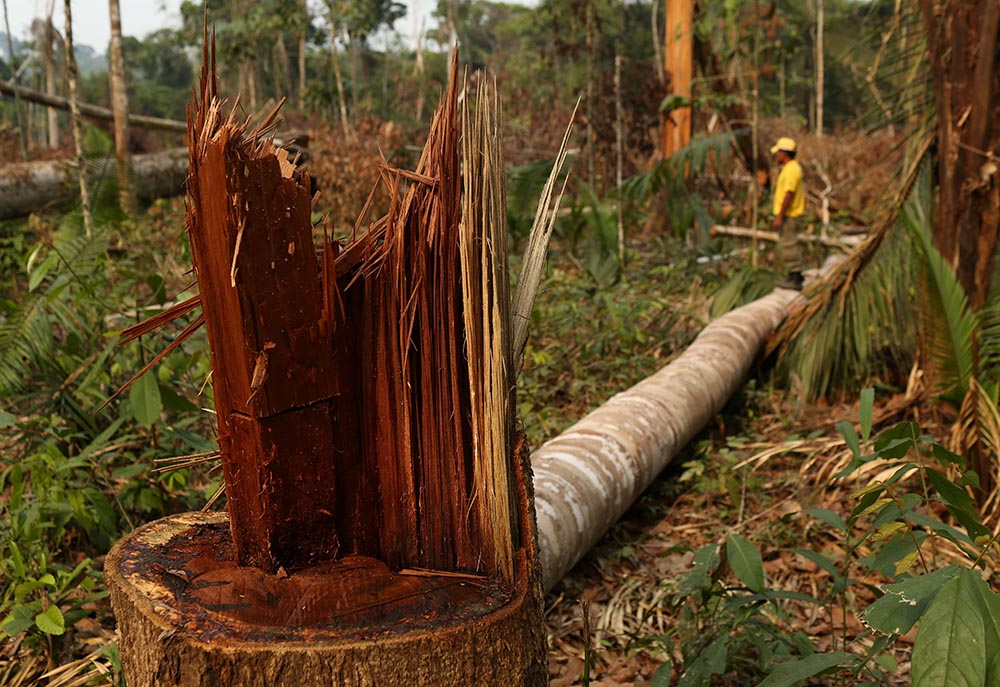
A member of the Chico Mendes Institute for Biodiversity Conservation is seen in a deforested area in the Bom Futuro National Forest in Rio Pardo, Brazil, Sept. 13, 2019. (CNS photo/Bruno Kelly, Reuters)
Later this year, nations will gather in Kunming, China, for the 15th U.N. Convention on Biological Diversity, also called COP15. Part of the gathering was held in October but the second half of the high-level meeting has been delayed and rescheduled several times due to the ongoing coronavirus pandemic.
Webinar participants were encouraged to sign onto the Healthy Planet, Healthy People petition organized by the Laudato Si' Movement. Signatures will be delivered to officials at COP15, as were the names who signed the petition ahead of the COP26 U.N. climate summit held in November in Glasgow, Scotland. So far, roughly 142,000 people have signed the petition.
Billed as the biggest biodiversity summit in a decade, COP15 is expected to bring together world leaders to set targets to stop and reverse biodiversity loss and establish a more sustainable framework for using the Earth's resources and living in greater harmony with nature.
To that end, focus will be on the "30 x 30" campaign to conserve 30% of the world's lands and oceans by 2030. Already, more than 70 countries, including the United States and European Union, have endorsed those targets, but many environmental activists believe that percentage is still too low.
Greg Asner, a biologist who directs Arizona State University's Center for Global Discovery and Conservation Science in Hawaii, said in the webinar that there's growing support within the U.N. biodiversity convention to raise the target to preserve 50% of the world's land. A 2020 Global Safety Net analysis he helped publish found that doing so would help restore ecosystems' ability to cope with and mitigate climate change and provide a buffer against pollution.
"The triad of pollution, climate change and biodiversity loss have combined themselves to create what I would think of as a global environmental issue of our time," he said.
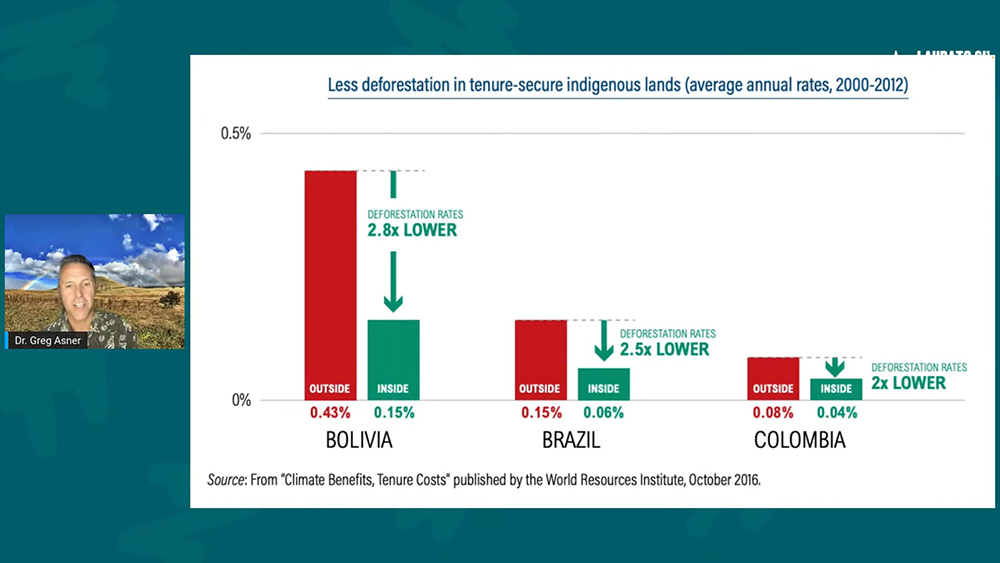
Studies have shown that territories under the protection of Indigenous peoples and local communities have been more protected than traditional protected areas, including in terms of deforestation, according to Greg Asner, a biologist and director of the Center for Global Discovery and Conservation Science based in Hawaii. (NCR screenshot)
Others have advocated for even greater protections.
"As a woman from India working with women in India and with Indigenous people, our vision is 100% biodiversity. ... If half of the planet loses its biodiversity, the other half will be destroyed anyway," said Vandana Shiva, a renowned Indian physicist and sustainable agriculture activist.
As it stands, roughly 15% of land and 6% of oceans are considered protected. But problems still arise when designated protected areas, including those of Indigenous peoples and local communities, are not formally recognized by countries, which leads to both illegal and state-sanctioned deforestation and oil and gas exploration, Asner said.
Speakers at the webinar stressed it was necessary to support the rights and territories of Indigenous communities who for centuries have been leaders in conservation and estimated to protect 80% of the world's biodiversity.
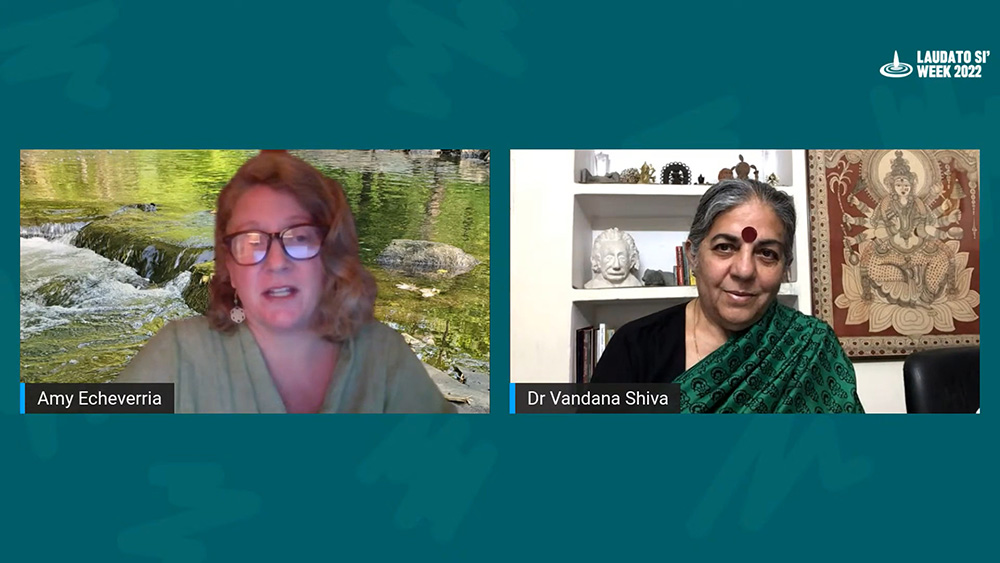
Amy Echeverria (left), international coordinator for justice, peace and ecology for the Missionary Society of St. Columban, introduces sustainable agriculture activist Vandana Shiva for a Vatican-sponsored event on biodiversity May 23 during Laudato Si' Week 2022. (NCR screenshot)
Shiva, who founded the Navdanya ("Nine Seeds") movement to establish seed banks to push back against corporate-owned monocultures, said that as there's increasingly "a huge rush to own biodiversity as a financial asset" and to exploit it, there's an even greater need to listen to Indigenous knowledge about living in balance with nature.
"When our hearts and our hands and our heads come in unity and in general humanity to create an integral ecology, we will have 100% of the Earth thriving with biodiversity. That should be our aim," she said.
Ardler, the Australian Aboriginal, said that "protecting and managing our ocean is a custodial and intergenerational responsibility." For her people, it also reflects cultural and spiritual values that have guided their relationship with the ocean and humpback whales, her community's totem creature.
"Our spiritual connection is to the ocean. We live and breathe it every single day," she said.








